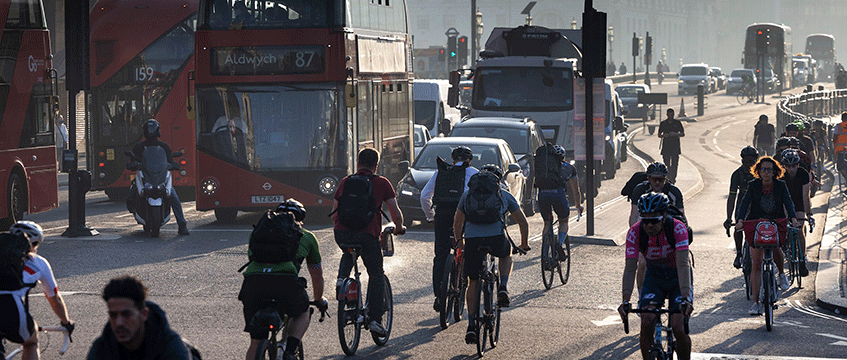Central London was awash with commuters heading back to work this week, as employers kicked off their office returns en masse for the first time since Covid-19 ravaged the capital in March last year.
The Tube network enjoyed its busiest start to the week since the pandemic began, according to Transport for London, with 3.59m entries and exits compared with the pre-pandemic baseline of 7.12m on Monday. Tuesday was even busier, with 3.94m taps on the Tube, representing 52% of normal demand and up by 11% from last week. These were only the second and third days since the pandemic began where the Tube recorded more than 2m taps.
That translated to a spike in office use, according to monitoring specialist Metrikus. Monday saw office use across the buildings it monitors hit 82% of February 2020 levels, another landmark post-pandemic figure.
Meanwhile, office developers including Landsec, British Land and Argent reported marked increases for the start of September, albeit more modest ones.
Robert Evans, chief executive of Argent’s King’s Cross development, said: “There has been a definite jump up this week… The kids going back to school combined with a number of companies thinking ahead has created a real ‘September’ moment.
He added: “We’ve seen a pickup across our offices, and my train in from Buckinghamshire was also notably busier this week – particularly on Tuesday – compared to previous weeks.”
Charlie Green, co-founder of The Office Group, added that offices across the flexible operator’s portfolio were around half-full on Tuesday, a 30% increase on the previous week.
“Now is the time when companies are addressing how they’re going to come back,” Green told EG. “And this week very much goes to show that hybrid working has been adopted by the majority.”
In-person interaction
The rise in commuters follows repeated government advice for people to return to work, after official work-from-home guidance was dropped on 19 July.
British Land’s head of campuses, David Lockyer, said the number of workers across the landlord’s offices “has certainly increased over the past week”.
However, he added: “We’ve always expected the return to the office to be a gradual transition from now to the end of 2021. The hybrid approach is here to stay, but businesses and their employees are still working out what that will mean in practice.
“Within our own business, while Covid has shown that flexible working can be effective, the recent increase in people coming back to our offices demonstrates how important in-person interaction is.”
At Landsec, managing director for London, Marcus Geddes, said the company has seen “a steady increase” in people returning to work over the summer, followed by a 16% uplift in occupancy across its office portfolio last week.
“Our most recent polling showed that 80% of office workers in London will feel comfortable returning to the office by the end of September, so we’re confident that these figures will only improve,” he added.
Some cities still lag behind
Despite the busy start to the week in London, activity in other UK cities was more subdued, according to traffic data from satnav firm TomTom.
While Birmingham, Wolverhampton, Nottingham, Leicester and Liverpool were as busy as they were in 2019, others including Manchester, Leeds, Bristol, Brighton and Belfast lagged behind.
This was also reflected in data from Freespace, which also monitors office use across the country.
It said Monday saw just 18% of workers back in the offices it has installed footfall sensors in.
The Centre for Cities think tank struck a similarly cautious tone, warning that hybrid working could yet spell trouble for city centre economies across the country.
Chief executive Andrew Carter said: “Although data from this week suggests more people headed into the office for at least a few days, footfall remains well below pre-pandemic levels in our biggest cities – the UK’s economic hubs.
“Increased footfall is good news for city centres, but if hybrid working becomes the norm then businesses such as cafés and pubs will have to adapt to a permanently reduced number of customers compared to pre-pandemic and that is likely to mean job losses.”
To send feedback, e-mail alex.daniel@eg.co.uk or tweet @alexmdaniel or @EGPropertyNews











